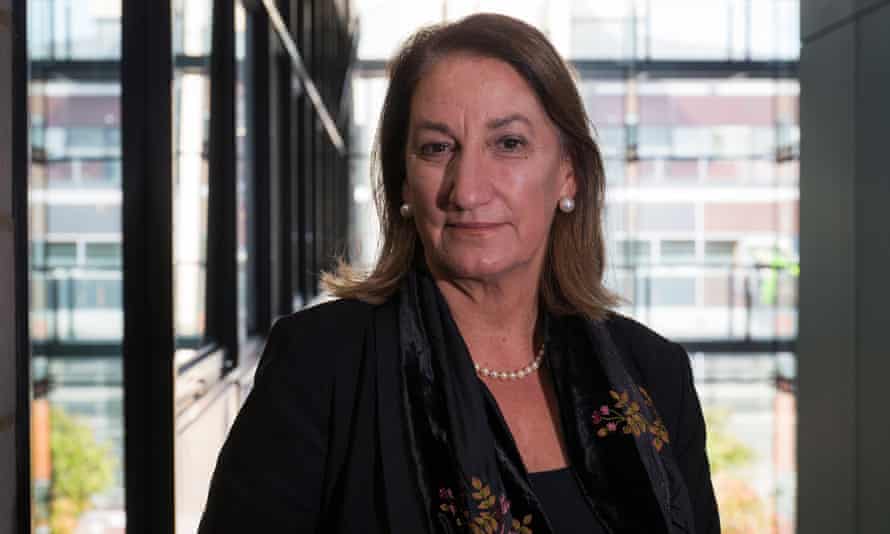When the University of Lincoln was first built on a derelict rail goods yard, it’s said that one of its buildings was designed to be converted into a shopping centre if the university didn’t work out.
While that may be an apocryphal story, it speaks to the tremendous success of the university and its value to the local community. Since its inception in 1996, Lincoln has grown from 500 students to 14,500, generating £430m for the local economy annually. In this small east Midlands city of 99,000 people it is a vital presence: one in six people either works with the university or studies there.
Local residents say the university has transformed Lincoln from provincial backwater to a culturally thriving, diverse city, with new shops and restaurants springing up to accommodate students and the graduates who stay to work in hi-tech businesses supported by the university.
Much of this transformation is credited to the university’s vice-chancellor, Mary Stuart, who retires in October after 12 years at the helm. During this period, she doubled student numbers by expanding its science and technology departments in key areas for the local economy.
“The story of Lincoln is about regeneration,” she said. “I am passionate about supporting your place, understanding your place, working with local people to get under the skin of a place so you are not telling or dictating, but you’re working with.”
David Willetts, the former universities minister who oversaw the switch to £9,000 student loans for tuition fees in 2012, has today called on the government to build universities in more places like Lincoln, such as Blackpool, to help regenerate local economies, and boost higher education funding by making graduates repay loans more quickly.

Writing in a paper for the Higher Education Policy Institute (Hepi), Willetts argues demand for university degrees remains high, and says the government should keep expanding the higher education sector as a way of encouraging economic growth.
He says that rather than attempt to reduce the numbers of school-leavers going into higher education, the government should continue to encourage campuses across England.
“Many towns without one see gaining a higher education institution as one of the best ways of boosting their prospects. They attract young people to an area instead of losing them as they go to university elsewhere,” he said. “Blackpool council is supposed to have turned down a new university decades ago, so it went to Lancaster instead: now is the time for Blackpool to rethink that decision. Other towns such as Wigan and Wakefield are candidates,” Willetts writes.
To enable other universities to replicate Lincoln’s success, Stuart would like to see greater support across government for universities’ role in economic development.
“We want to help the levelling up agenda, we’re doing everything we can to support it. I’ve always been very aware there’s a disparity between regions – in particular, the east Midlands doesn’t get a lot of funding. We’ve been working really hard and using our resources wherever we can, and some recognition for universities – not just Lincoln – that do this work would be great,” she said.
She added this should be underpinned by a university funding model that is “fair to students, fair to graduates, and fair to universities”, reflecting the benefits universities bring even to those who do not attend.
To encourage graduates to stay on and give back to the region after their studies, Lincoln targets pupils in local schools. Many recruits are from deprived post-industrial rural and coastal areas, and schools say they would not have considered an option outside their region.
The university also collaborates with local employers to create highly skilled jobs. This has included a new science and innovation park, as well as partnerships with Siemens, which expanded its presence in Lincoln as a result, and Lincolnshire Co-operative. It also founded the Lincoln Institute for Agri-food Technology to support Lincolnshire’s role in producing 12% of the UK’s food supply.
The result is a city which appreciates the contribution its students make. Will Porter, a third year student at the university’s new medical school, said he has felt “very welcomed and valued” by local residents. “The people I’ve spoken to see [the university] as a positive thing, it creates jobs, more buzz, and excitement and more things to do,” he said.
His view is echoed by local business-owner Ben Poole. His shop, Imperial Teas, has grown thanks to increased custom, especially from students’ parents, and he regularly employs students. He also works closely with the university’s performing arts department to produce community theatre productions.
Poole says: “The effect on the economy has been dramatic – the city has grown tremendously since the arrival of the university. I can’t see a downside to the impact it’s had. I’m sure most businesses would say they’ve benefited.”
Stay connected with us on social media platform for instant update click here to join our Twitter, & Facebook
We are now on Telegram. Click here to join our channel (@TechiUpdate) and stay updated with the latest Technology headlines.
For all the latest Education News Click Here
For the latest news and updates, follow us on Google News.
